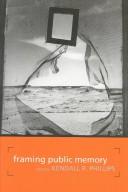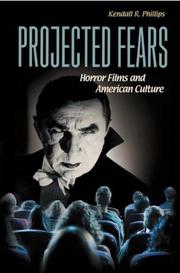| Listing 1 - 9 of 9 |
Sort by
|

ISBN: 0817380256 9780817380250 9780817313890 0817313893 9780817354909 0817354905 0817313893 Year: 2004 Publisher: Tuscaloosa University of Alabama Press
Abstract | Keywords | Export | Availability | Bookmark
 Loading...
Loading...Choose an application
- Reference Manager
- EndNote
- RefWorks (Direct export to RefWorks)
A collection of essays by prominent scholars from many disciplines on the construction of public memories. The study of public memory has grown rapidly across numerous disciplines in recent years, among them American studies, history, philosophy, sociology, architecture, and communications. As scholars probe acts of collective remembrance, they have shed light on the cultural processes of memory. Essays contained in this volume address issues such as the scope of public memory, the ways we forget, the relationship between politics and memory, and the material p
History --- Public history --- Historiography. --- Memory --- Public history. --- History, Modern --- Applied history --- Historical criticism --- Authorship --- Retention (Psychology) --- Intellect --- Psychology --- Thought and thinking --- Comprehension --- Executive functions (Neuropsychology) --- Mnemonics --- Perseveration (Psychology) --- Reproduction (Psychology) --- Philosophy. --- Psychological aspects. --- Social aspects. --- Philosophy --- Criticism --- Historiography --- Histoire appliquée --- Mémoire --- Histoire --- Historiographie --- Aspect social --- Aspect psychologique --- Philosophie
Book
ISBN: 1280881755 9786613723062 0809330970 9780809330973 9780809330959 0809330954 9781280881756 6613723061 Year: 2012 Publisher: Carbondale : Southern Illinois University Press,
Abstract | Keywords | Export | Availability | Bookmark
 Loading...
Loading...Choose an application
- Reference Manager
- EndNote
- RefWorks (Direct export to RefWorks)
A Nightmare on Elm Street. Halloween. Night of the Living Dead. These films have been indelibly stamped on moviegoers' psyches and are now considered seminal works of horror. Guiding readers along the twisted paths between audience, auteur, and cultural history, author Kendall R. Phillips reveals the macabre visions of these films' directors in Dark Directions: Romero, Craven, Carpenter, and the Modern Horror Film. Phillips begins by analyzing the works of George Romero, focusing on how the body is used cinematically to reflect the duality
Horror films --- History and criticism. --- Carpenter, John, --- Craven, Wes --- Romero, George A. --- Armitage, Frank, --- Carpenter, Johnny, --- Chance, James T., --- Chance, John T., --- Haight, Rip, --- Quatermass, Martin, --- Craven, Wesley Earl --- Criticism and interpretation.
Book
ISBN: 3030741362 3030741354 9783030741365 Year: 2021 Publisher: Cham : Springer International Publishing : Imprint: Palgrave Macmillan,
Abstract | Keywords | Export | Availability | Bookmark
 Loading...
Loading...Choose an application
- Reference Manager
- EndNote
- RefWorks (Direct export to RefWorks)
Phillips offers an incisive, subtle, and compelling analysis of the cinematic present that also poses difficult questions for the political present. A Cinema of Hopelessness has the courage to deeply examine contemporary popular cinema in a political context. While pointing to a generalized affective atmosphere of hopelessness, this book does not succumb to negativity. On the contrary, out of hopelessness, Phillips glimpses the contours of hope, a way out, a future that contemporary cinema gives us the possibility of imagining. - Dr Richard Rushton, Lancaster University This book explores the circulation of anger and hostility in contemporary American culture with particular attention to the fantasy of refusal, a dream of rejecting all the structures of the contemporary political and economic system. Framing the question of public sentiment through the lens of rhetorical studies, this book traces the circulation of symbols that craft public feelings in contemporary popular cinema. Analyzing popular twenty-first century films as invitations to a particular way of feeling, the book delves into the way popular sentiments are circulated and intensified. The book examines dystopian films (The Purge, The Cabin in the Woods), science fiction (Snowpiercer), and superhero narratives (the Marvel Cinematic Universe and Joker). Across these varied films, an affective economy that emphasizes grief, betrayal, refusal, and an underlying rage at the seeming hopelessness of contemporary culture is uncovered. These examinations are framed in terms of ongoing political protests ranging from Occupy Wall Street, the Tea Party, Black Lives Matter, and the 6th January 2021 invasion of the US Capitol Building. Kendall R. Phillips is Professor of Communication and Rhetorical Studies at Syracuse University, USA. His publications include Projected Fears: Horror Films and American Culture (2005), Dark Directions: Romero, Craven, Carpenter and the Modern Horror Film (2012) and A Place of Darkness: The Rhetoric of Horror in Early American Cinema (2018).
Motion pictures --- Government, Resistance to --- Politics in motion pictures. --- Civil resistance --- Non-resistance to government --- Resistance to government --- Political science --- Political violence --- Insurgency --- Nonviolence --- Revolutions --- In motion pictures. --- Motion pictures, American. --- Culture—Study and teaching. --- America—Politics and government. --- American Film and TV. --- Cultural Studies. --- American Politics. --- American motion pictures --- Moving-pictures, American --- Foreign films
Multi
ISBN: 9783030741365 9783030741372 9783030741358 Year: 2021 Publisher: Cham Springer International Publishing, Imprint: Palgrave Macmillan
Abstract | Keywords | Export | Availability | Bookmark
 Loading...
Loading...Choose an application
- Reference Manager
- EndNote
- RefWorks (Direct export to RefWorks)
Phillips offers an incisive, subtle, and compelling analysis of the cinematic present that also poses difficult questions for the political present. A Cinema of Hopelessness has the courage to deeply examine contemporary popular cinema in a political context. While pointing to a generalized affective atmosphere of hopelessness, this book does not succumb to negativity. On the contrary, out of hopelessness, Phillips glimpses the contours of hope, a way out, a future that contemporary cinema gives us the possibility of imagining. - Dr Richard Rushton, Lancaster University This book explores the circulation of anger and hostility in contemporary American culture with particular attention to the fantasy of refusal, a dream of rejecting all the structures of the contemporary political and economic system. Framing the question of public sentiment through the lens of rhetorical studies, this book traces the circulation of symbols that craft public feelings in contemporary popular cinema. Analyzing popular twenty-first century films as invitations to a particular way of feeling, the book delves into the way popular sentiments are circulated and intensified. The book examines dystopian films (The Purge, The Cabin in the Woods), science fiction (Snowpiercer), and superhero narratives (the Marvel Cinematic Universe and Joker). Across these varied films, an affective economy that emphasizes grief, betrayal, refusal, and an underlying rage at the seeming hopelessness of contemporary culture is uncovered. These examinations are framed in terms of ongoing political protests ranging from Occupy Wall Street, the Tea Party, Black Lives Matter, and the 6th January 2021 invasion of the US Capitol Building. Kendall R. Phillips is Professor of Communication and Rhetorical Studies at Syracuse University, USA. His publications include Projected Fears: Horror Films and American Culture (2005), Dark Directions: Romero, Craven, Carpenter and the Modern Horror Film (2012) and A Place of Darkness: The Rhetoric of Horror in Early American Cinema (2018).
Philosophy and psychology of culture --- Sociology of culture --- Film --- TV (televisie) --- cultuur --- film --- America --- Motion pictures --- Government, Resistance to, in motion pictures. --- Politics in motion pictures. --- Industrie du cinéma --- Résistance politique --- Science politique --- Industrie du cinéma --- Résistance politique

ISBN: 0275983536 Year: 2005 Publisher: Westport, Conn. : Praeger Publishers,
Abstract | Keywords | Export | Availability | Bookmark
 Loading...
Loading...Choose an application
- Reference Manager
- EndNote
- RefWorks (Direct export to RefWorks)
Horror films --- Films d'horreur --- History and criticism. --- Histoire et critique
Book
ISBN: 1477315527 Year: 2018 Publisher: Austin, Texas : University of Texas Press,
Abstract | Keywords | Export | Availability | Bookmark
 Loading...
Loading...Choose an application
- Reference Manager
- EndNote
- RefWorks (Direct export to RefWorks)
Book
ISBN: 9781477315521 1477315527 9781477315507 1477315500 9781477315514 1477315519 Year: 2021 Publisher: Austin
Abstract | Keywords | Export | Availability | Bookmark
 Loading...
Loading...Choose an application
- Reference Manager
- EndNote
- RefWorks (Direct export to RefWorks)
Book
ISBN: 081738569X 9780817356767 0817356762 9780817385699 9780817317430 0817317430 Year: 2011 Publisher: Tuscaloosa University of Alabama Press
Abstract | Keywords | Export | Availability | Bookmark
 Loading...
Loading...Choose an application
- Reference Manager
- EndNote
- RefWorks (Direct export to RefWorks)
The transnational movement of people and ideas has led scholars throughout the humanities to reconsider many core concepts. Among them is the notion of public memory and how it changes when collective memories are no longer grounded within the confines of the traditional nation-state. An introduction by coeditors Kendall Phillips and Mitchell Reyes provides a context for examining the challenges of remembrance in a globalized world. In their essay they posit the idea of the "global memoryscape," a sphere in which memories circulate among inc
Globalization --- Memory --- Collective memory --- Transnationalism --- National characteristics --- Social psychology --- Sociology & Social History --- Social Sciences --- Social Change --- Social aspects --- Collective memory. --- Transnationalism. --- National characteristics. --- Social psychology. --- Erinnerung. --- Globalisierung. --- Kollektives Gedächtnis. --- Nationalbewusstsein. --- Nationalcharakter. --- Social aspects. --- Mass psychology --- Psychology, Social --- Characteristics, National --- Identity, National --- Images, National --- National identity --- National images --- National psychology --- Psychology, National --- Collective remembrance --- Common memory --- Cultural memory --- Emblematic memory --- Historical memory --- National memory --- Public memory --- Social memory --- Retention (Psychology) --- Trans-nationalism --- Transnational migration --- Human ecology --- Psychology --- Social groups --- Sociology --- Anthropology --- Nationalism --- Ethnopsychology --- Exceptionalism --- Group identity --- Intellect --- Thought and thinking --- Comprehension --- Executive functions (Neuropsychology) --- Mnemonics --- Perseveration (Psychology) --- Reproduction (Psychology) --- International relations
Book
ISBN: 9783030741365 9783030741372 9783030741358 Year: 2021 Publisher: Cham Springer International Publishing :Imprint: Palgrave Macmillan
Abstract | Keywords | Export | Availability | Bookmark
 Loading...
Loading...Choose an application
- Reference Manager
- EndNote
- RefWorks (Direct export to RefWorks)
Philosophy and psychology of culture --- Sociology of culture --- Film --- TV (televisie) --- cultuur --- film --- America --- Motion pictures --- Government, Resistance to, in motion pictures. --- Politics in motion pictures. --- Industrie du cinéma --- Résistance politique --- Science politique
| Listing 1 - 9 of 9 |
Sort by
|

 Search
Search Feedback
Feedback About UniCat
About UniCat  Help
Help News
News